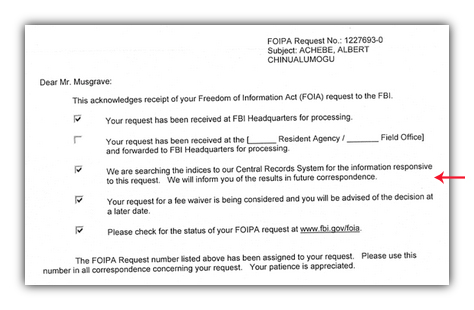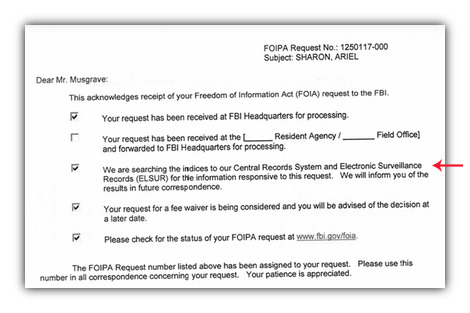Public records expert Ryan Shapiro, who has over 600 active FOIA requests on file with the FBI, offered a number of key insights for dealing with the agency in his Requester’s Voice in December.
“The FBI does nearly everything within its power to avoid compliance with the Freedom of Information Act,” Shapiro said, comparing his back-and-forth with the agency to a “street fight.”
“One of the chief means by which the FBI accomplishes this is to deliberately search for records in such a way that the search routinely fails by design,” he said.
In particular, Shapiro said the agency responds to basic FOIA requests with a search restricted solely to its Central Records System, a limited database that may not include all records of interest.
Shapiro offers two quick tips to avoid this pitfall and prod the FBI to conduct a more thorough search:
Request any “cross-referenced” records relevant to your inquiry. The agency will not include them in a typical FOIA request unless the user explicitly references them.
Request a search of “ELSUR” (Electronic Surveillance) records. These include the names of all people and/or locations for which the agency sought a court order for electronic surveillance.
Unless you include these two components in your request letter, the FBI will not search for these categories of documents. Having followed Shapiro’s advice, MuckRock has already seen a difference in our requests.
For example, compare these two acknowledgement letters to requests for high-profile FBI files, one submitted without Shapiro’s suggested language, and the other with these additions:

Chinua Achebe (filed without ELSUR request language): “We are searching the indices to our Central Records System for the information responsive to this request. We will inform you of the results in future correspondence.”

Ariel Sharon (filed with ELSUR request language): “We are searching the indices to our Central Records System and Electronic Surveillance Records (ELSUR) for the information responsive to this request. We will inform you of the results in future correspondence.”
The FBI will still frequently resist conducting these kinds of searches, according to Shapiro. Requesters should carefully review their letter to ensure the Bureau is complying with the parameters of their search. If that fails, record seekers can appeal the decision to the Department of Justice Office of Information Policy.
As a last resort, users can always take the FBI to court—Shapiro himself has five active lawsuits against the agency regarding about 200 of his requests.
Image via FBI.gov




